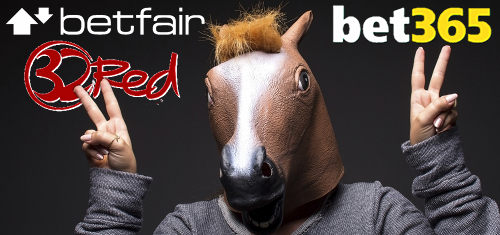 UK racing has announced the first official Authorized Betting Partners (ABP) under its controversial new sponsorship rules.
UK racing has announced the first official Authorized Betting Partners (ABP) under its controversial new sponsorship rules.
On Thursday, the British Horseracing Authority (BHA) announced that Betfair, Bet365 and 32Red had been officially awarded the ABP designation, which will be required as of Jan. 1, 2016 for any betting operator wishing to enter into sponsorship deals with the UK’s major racing groups.
The three firms had already received unofficial ABP status after agreeing to contribute a sufficiently large portion of their online race betting revenue to UK racing. Thursday’s announcement officially puts other betting firms on notice that their UK racing sponsorships are in jeopardy unless they too give racing its pound of flesh.
Terms of the Bet365 and 32Red deals weren’t disclosed, but Betfair has agreed to a three-year deal effective April 1, 2016. Betfair already had a five-year pact with racing that was set to run until March 2017 but the final year of that deal will be supplanted by the first year of the new deal. Betfair’s deal is based on a new ABP rate card, details of which the BHA will publicly disclose “in the coming days.”
BHA boss Nick Rust said racing welcomed the “enlightened approach” taken by Betfair, who Rust claimed recognized “the interdependence between racing and betting, as well as the benefits associated with being an authorized betting partner.”
Said benefits include the “use of a kitemark and promotional benefits as part of a marketing campaign to be rolled out across the sport.” ABPs will also enjoy “preferential commercial arrangements” with participating racetracks, including “sponsorship opportunities, Wi-Fi provision and wider promotion.”
Betfair’s deal won’t extend to Irish betting operator Paddy Power, with which Betfair is planning to merge early next year. The Paddsters have been vocal in their opposition to the ABP scheme, which they believe might violate UK anti-competitive guidelines.
UNAUTHORIZED BETTING NON-PARTNERS
The BHA said negotiations with other bookmakers are at “an advanced stage” but those bookies likely don’t include Coral, which announced Thursday that it had signed its first racing sponsorship in Ireland after receiving its new Irish betting license. Coral says it will lend its name to an entire card of racing at Leopardstown in January and will continue to do so for two years after that, while warning that its longstanding sponsorship of the Welsh National and Eclipse Stakes were under threat from the BHA’s demands.
Betfred also isn’t willing to submit to the BHA’s strong-arm tactics, having already given up its sponsorship of the 2016 Cheltenham Gold Cup and Sprint Cup at Haydock. Last week, Befred boss Fred Done told the Racing Post that he’d been willing to re-up but the Jockey Club, which controls both races, balked at renewing unless Betfred met the ABP criteria.
Undaunted, Done said that if racing wanted to “rip those contracts up now, I’ll rip them up with you. We’ll walk away and keep our money in our pocket. Sometimes you have to stand up for your principles and that’s what this is about.” Done went on to characterize relations between betting and racing as “worse than they’ve ever been. There’s no trust.”
32Red currently sponsors “around 1,000” races per year and says it will be happy to snap up any sponsorships left unwanted by ABP laggards. That said, 32Red CEO Ed Ware urged other bookies to join them in the ABP’s exclusive hot-tub.
MEET THE NEW LEVY, SAME AS THE OLD LEVY
Meanwhile, the UK government has, for the moment, given up trying to impose a permanent replacement to the annual Levy scheme. Talks between racing and betting over the 55th Levy scheme broke down last month, leaving the Department of Culture, Media and Sport with the onerous task of deciding what to do when the current scheme expires on March 31, 2016.
Racing had been hoping the government would make good on its vow to impose a new Horserace Betting Right but the government said Thursday that it would simply roll over the current Levy deal on April 1, giving itself another year in which to arrive at a more permanent solution.
